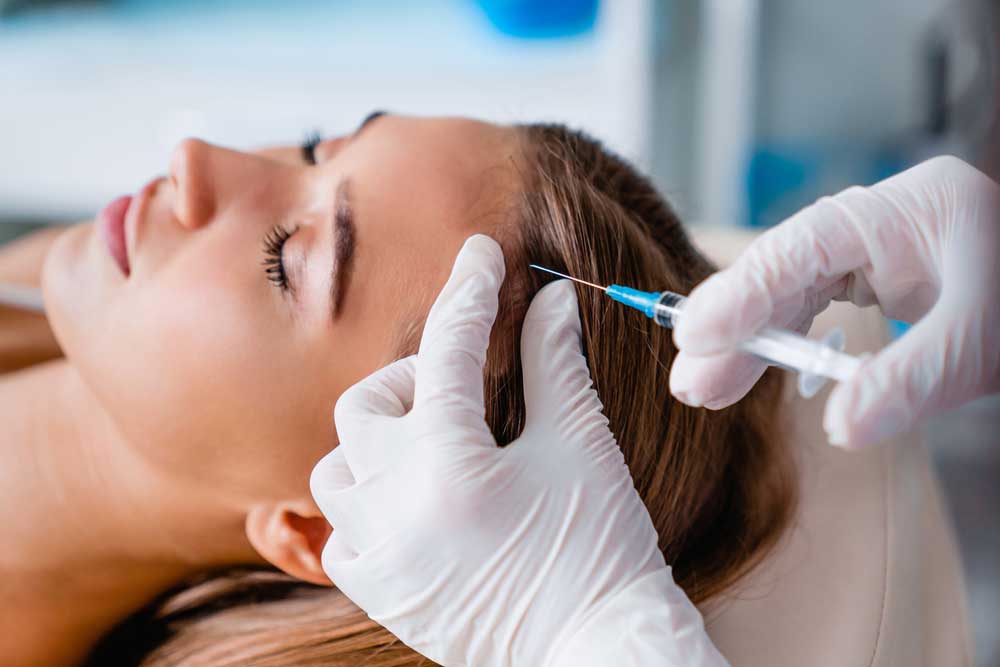Have you ever looked in the mirror while fixing your hair and found an abnormal amount of hair loss? It’s normal to lose a certain amount of hair every day as we age. In fact, according to this study, most people lose 50 to 100 hairs per day as part of the normal cycle- more so when you wash your hair.
However, if you shed more hair than the normal cycle and notice it on your pillow, in your shower drain, or on your comb, it may bring you to question why you’re suddenly losing so much hair. In that case, it’s time to seek an expert and know the cause of the problem. The best thing you can do is visit a hair specialist, as they’ll get to the bottom of the problem and make sure to give you a hair loss solution to treat the problem. Here’s an overview of some common causes of hair loss, as well as some common hair loss treatments.
Possible Causes of Hair Loss
Many reasons, individually or combined, lead to hair loss. Hair loss can be permanent or temporary. The good news here is that there are many treatments for hair loss with today’s advancements in medical science. From FUE hair transplant to FUT, you can have natural-looking hair back.
Sudden significant hair loss is typically a sign of two conditions:
- Telogen effluvium
- Alopecia areata
Telogen effluvium is generally caused by stress. In contrast, alopecia areata is an autoimmune condition.
See Also: Is Losing 200-300 Hairs a Day Normal?
More about Telogen Effluvium
It’s a condition where the hair remains in the telogen (natural shedding) phase of the growth cycle, which causes sudden and excessive hair loss. This is a temporary hair fall type caused by situations considered stressful by your body. Some possible causes that trigger this condition are:
1. Hormonal Imbalance
Hormones play a vital role in the growth of your hair. Hormonal imbalance is a common cause of hair loss, especially in women. Women may experience significant hair loss following childbirth or during menopause. Besides genetic baldness, changes in their hormonal composition with age can also cause hair loss in men.
2. Stress
It’s no myth that stress can lead to hair loss. Both physical and psychological stress can cause significant hair loss. Stress can trigger scalp problems, such as dandruff, or other issues, like disruptive eating habits and abnormalities with the digestive system. All these problems can have a big negative impact on hair loss.
3. Thyroid Disorder
The thyroid is a common and well-known hormone-related reason for hair loss. Having too much or too little thyroid hormone can lead to a hair loss problem.
4. Nutritional Deficiency
Food plays a major role in your hair and your entire body. Eating the right food full of vitamins and minerals is crucial to being healthy. Deficiencies like iron, B12, and zinc can lead to hair loss problems.
5. Medications or Major Physical Trauma Like Surgery
Hair loss can be due to the after-effects of several types of medicines and drugs. Chemotherapy is one such well-known cause. Moreover, suddenly stopping the use of medications that contain estrogen or any physical trauma and surgery can also lead to hair loss.
How Does Alopecia Areata Cause Hair Loss?
Alopecia areata is an autoimmune condition that causes your body to attack its follicles, resulting in hair loss. Unlike telogen effluvium, instead of excess hair fall, it creates a condition that tends to cause round, bald patches that may eventually merge into larger bald spots. You’re more at risk of alopecia aerate if a blood relative has had the condition.
Treatments of Sudden Hair Loss
The type of treatment that is best for you is determined by several factors. The type of hair loss and the person’s health determines which treatment best suits the hair fall. Suddenly losing so much hair can be intimidating, so it is better to seek expert advice before finalizing any treatment.
Some effective hair restoration treatments include:
- PRP hair treatment
- FUE transplant
- FUT transplant
FUE Hair Transplant
FUE is a Follicular Unit Extraction transplant in which hair units are harvested from the scalp. In the process, doctors harvest hair from the scalp or donor areas. The harvested follicles are transplanted through microscopic circular incisions on the individual’s scalp.
FUT Hair Transplant
FUT stands for Follicular Unit Transplantation, sometimes known as the strip method. In this method, a long thin piece of tissue is removed from the back of the patient’s scalp. Then, individual follicular units are harvested from the strip and finally transplanted into the target areas.
PRP Hair Treatment
PRP is a platelet-rich plasma treatment consisting of a three-step medical process. Here, a person’s blood is drawn, processed, and then injected into the scalp. You can receive the PRP hair treatment in NJ if you opt for a reliable hair restoration practice for treatment.
See Also: What’s the Average Cost of PRP for Hair Loss in NJ?
Hair loss is a common problem noticed by 8 out of 10 people. However, it can be prevented following the right treatment and care. Contact our hair experts at the New Jersey Hair Restoration Center if you are concerned about your significant hair loss. We are led by Dr. Emil Shakov, who is regarded as the leading hair transplant doctor in NJ.
Don’t wait! The sooner you detect hair loss symptoms, the sooner you can visit a professional to prevent irreversible damage. With the leading hair transplant treatment in New Jersey, you can resolve your hair loss problem and achieve a completely natural look.


